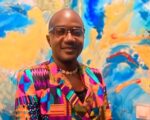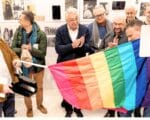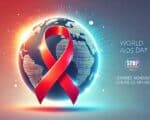Ils étaient plusieurs centaines à défiler ce dimanche 24 novembre dans les rues de New Delhi pour dénoncer la stigmatisation des homosexuels dans une société indienne ultra-conservatrice, où la religion joue également un rôle significatif dans la formation des coutumes et traditions.
Pas de slogans spécialement provocateurs si ce n’est le droit de pouvoir vivre dignement, et des champs de ballons, d’arcs en ciel qui flottaient dans une ambiance festive. Les manifestants réclamaient de pouvoir indiquer le sexe de leur choix dans les recensements nationaux, des cartes d’identité pour pouvoir participer aux élections, et d’autres documents gouvernementaux.
« Un océan de couleurs mais pas une joyeuse parade communautaire d’hommes qui s’amusent… » a déclaré un étudiant en droit qui a pris la parole pendant le défilé. « Cette mobilisation est un acte solidaire pour tous les LGBT discriminés dans le pays. Nous devons mettre fin à cette répression qui date de l’ère de la domination britannique. »
Dépénalisées depuis 2009, la décision de la Haute Cour de Delhi n’a juridiquement que très peu d’effet, et les relations homosexuelles sont toujours considérées comme un sujet tabou par la société civile et par le gouvernement. D’ailleurs, aucun des grands partis politiques indiens n’a vraiment mentionné les droits des homosexuels dans son manifeste ou lors de tribunes.
Et bien que certaines production « bollywoodiennes » se soient essayées en abordant le propos, la tolérance vient très lentement, d’où la nécessité pour beaucoup des participants à la marche de porter des masques ou des foulards afin de garder l’anonymat. « Faire un coming-out ou se dévoiler dans sa famille reste un risque majeur… ».
Terry G./Joëlle B. @stop_homophobie
>> Hundreds of gay rights activists have marched through the streets of New Delhi to demand an end to gay people being stigmatised in India’s deeply conservative society.
There was a carnival atmosphere on Sunday as activists sang songs and carried rainbow coloured flags and balloons while marching to the beat of traditional Indian drums.
Demonstrators urged an end to discrimination against gays, lesbians and transgenders four years after a colonial-era law that criminalised gay sex was overturned.
They also demanded that people be allowed to record the gender of their choice in the national census, voter identity cards and other government documents.
One law student taking part stressed that the event was not just about gay men having fun, but more « a community coming together as an act of solidarity ».
Ashok Chauhan, an advertising executive in his mid-40s, said he had cycled 8km to the parade to support his friends in their choice of sexuality.
« It’s a matter of choice, and each one of us has the right to choose, » he said.
The march ended with a public meeting at Jantar Mantar, the main area for protests in New Delhi.
In 2009, the Delhi High Court decriminalized gay sex, which until then had been punishable by up to 10 years in prison.
In some big Indian cities, homosexuality is slowly gaining acceptance, and a few high-profile Bollywood films have dealt with gay issues.
Even so, many marchers on Sunday covered their faces with scarves or wore masks because they have not told their friends and families about their sexuality.


















